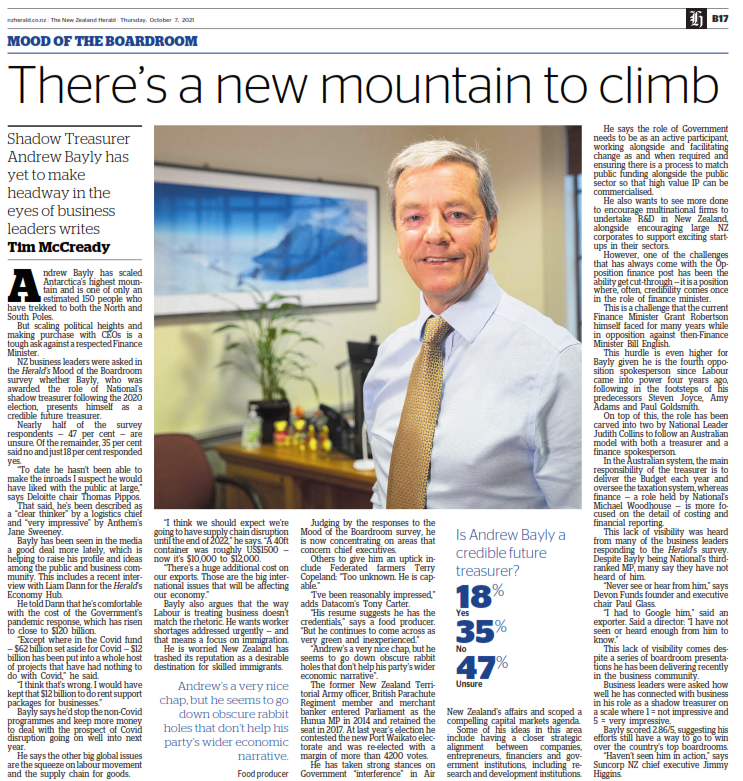There’s a new mountain to climb
Andrew Bayly has scaled Antarctica’s highest mountain and is one of only an estimated 150 people who have trekked to both the North and South Poles.
But scaling political heights and making purchase with CEOs is a tough ask against a respected Finance Minister.
NZ business leaders were asked in the Herald’s Mood of the Boardroom survey whether Bayly, who was awarded the role of National’s shadow treasurer following the 2020 election, presents himself as a credible future treasurer.
Nearly half of the survey respondents — 47 per cent — are unsure. Of the remainder, 35 per cent said no and just 18 per cent responded yes.
“To date he hasn’t been able to make the inroads I suspect he would have liked with the public at large,” says Deloitte chair Thomas Pippos.
That said, he’s been described as a “clear thinker” by a logistics chief and “very impressive” by Anthem’s Jane Sweeney.
Bayly has been seen in the media a good deal more lately, which is helping to raise his profile and ideas among the public and business community. This includes a recent interview with Liam Dann for the Herald’s Economy Hub.
He told Dann that he’s comfortable with the cost of the Government’s pandemic response, which has risen to close to $120 billion.
“Except where in the Covid fund — $62 billion set aside for Covid — $12 billion has been put into a whole host of projects that have had nothing to do with Covid,” he said.
“I think that’s wrong. I would have kept that $12 billion to do rent support packages for businesses.”
Bayly says he’d stop the non-Covid programmes and keep more money to deal with the prospect of Covid disruption going on well into next year.
He says the other big global issues are the squeeze on labour movement and the supply chain for goods.
“I think we should expect we’re going to have supply chain disruption until the end of 2022,” he says.
“A 40ft container was roughly US$1500 — now it’s $10,000 to $12,000.
“There’s a huge additional cost on our exports. Those are the big international issues that will be affecting our economy.”
Bayly also argues that the way Labour is treating business doesn’t match the rhetoric. He wants worker shortages addressed urgently — and that means a focus on immigration.
He is worried New Zealand has trashed its reputation as a desirable destination for skilled immigrants.
Judging by the responses to the Mood of the Boardroom survey, he is now concentrating on areas that concern chief executives.
Others to give him an uptick include Federated farmers Terry Copeland: “Too unknown. He is capable.”
“I’ve been reasonably impressed,” adds Datacom’s Tony Carter.
“His resume suggests he has the credentials,” says a food producer. “But he continues to come across as very green and inexperienced.”
“Andrew’s a very nice chap, but he seems to go down obscure rabbit holes that don’t help his party’s wider economic narrative”.
The former New Zealand Territorial Army officer, British Parachute Regiment member and merchant banker entered Parliament as the Hunua MP in 2014 and retained the seat in 2017. At last year’s election he contested the new Port Waikato electorate and was re-elected with a margin of more than 4200 votes.
He has taken strong stances on Government “interference” in Air New Zealand’s affairs and scoped a compelling capital markets agenda.
Some of his ideas in this area include having a closer strategic alignment between companies, entrepreneurs, financiers and government institutions, including research and development institutions.
He says the role of Government needs to be as an active participant, working alongside and facilitating change as and when required and ensuring there is a process to match public funding alongside the public sector so that high value IP can be commercialised.
He also wants to see more done to encourage multinational firms to undertake R&D in New Zealand, alongside encouraging large NZ corporates to support exciting start-ups in their sectors.
However, one of the challenges that has always come with the Opposition finance post has been the ability get cut-through — it is a position where, often, credibility comes once in the role of finance minister.
This is a challenge that the current Finance Minister Grant Robertson himself faced for many years while in opposition against then-Finance Minister Bill English.
This hurdle is even higher for Bayly given he is the fourth opposition spokesperson since Labour came into power four years ago, following in the footsteps of his predecessors Steven Joyce, Amy Adams and Paul Goldsmith.
On top of this, the role has been carved into two by National Leader Judith Collins to follow an Australian model with both a treasurer and a finance spokesperson.
In the Australian system, the main responsibility of the treasurer is to deliver the Budget each year and oversee the taxation system, whereas finance — a role held by National’s Michael Woodhouse — is more focused on the detail of costing and financial reporting.
This lack of visibility was heard from many of the business leaders responding to the Herald’s survey.
Despite Bayly being National’s third-ranked MP, many say they have not heard of him.
“Never see or hear from him,” says Devon Funds founder and executive chair Paul Glass.
“I had to Google him,” said an exporter. Said a director: “I have not seen or heard enough from him to know.”
This lack of visibility comes despite a series of boardroom presentations he has been delivering recently in the business community.
Business leaders were asked how well he has connected with business in his role as a shadow treasurer on a scale where 1 = not impressive and 5 = very impressive.
Bayly scored 2.86/5, suggesting his efforts still have a way to go to win over the country’s top boardrooms.
“Haven’t seen him in action,” says Suncorp NZ chief executive Jimmy Higgins.
